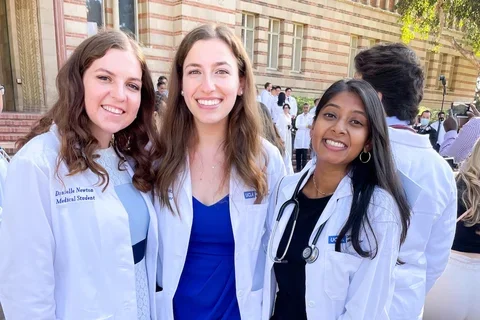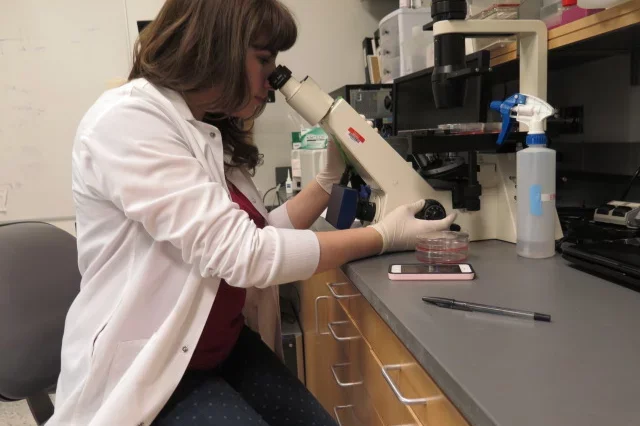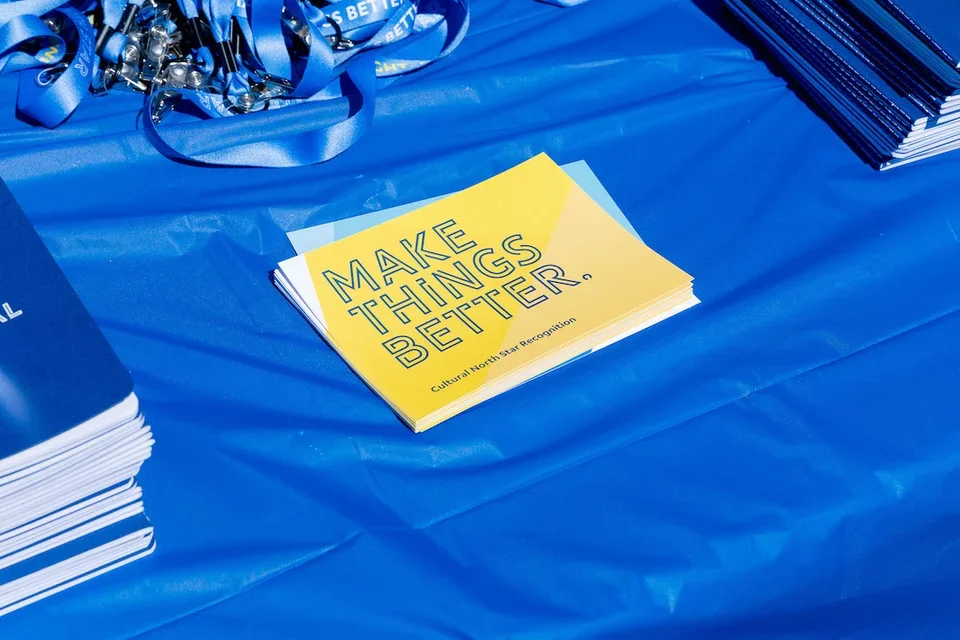Making Things Better for Cancer Patients and Their Families
Student Spotlight

Meet Sara Sakowitz
Sara Sakowitz is an East Coast transplant pursuing her Doctor of Medicine (MD) and Master of Business Administration (MBA) at UCLA.
Fun facts:
- She speaks German and studied German literature in college.
- She has master’s degrees in both science and public health.
- She was inducted into the Delta Omega Honorary Society in Public Health.
- She was the youngest-ever winner of Columbia University's Venture Competition
What Makes Cancer Cancer?
Sara’s insatiable childhood curiosity drew her to the basic sciences.
“I grew up just loving to ask questions,” she says. “That was a huge part of my childhood, and as I kept going through school, science was the one area where I felt like I could ask the most questions.”
In high school, losing a family member to cancer turned her scientific interests into a calling to pursue a career in medicine.
“I wanted to learn everything I could about what made cancer cancer, and what the science underlying that disease was.”
That core desire motivated her to become a scientific researcher and excel during college and graduate school. As a medical school student at the David Geffen School of Medicine at UCLA (DGSOM), Sara satisfies her thirst for knowledge every day.
“The minute I came to campus, I found amazing mentors who pushed me to ask questions about things I noticed,” she says. “I’ve had the privilege of treating patients and then coming to my lab to dive into research projects about the diseases or procedures I had seen that day.”

Studying Business and Medicine Simultaneously
Sara finds UCLA’s emphasis on discovery rewarding. DGSOM's medical school curriculum, for example, includes DGSOM Discovery, a requirement for third-year medical students. It provides them with protected time for a substantive creative and scholarly experience in an area of their interest.
Sara saw her discovery period as an opportunity to conduct medical research and ask questions and also to develop her problem-solving skills and creative mindset, which ultimately led her to pursue an MBA at the UCLA Anderson School of Management.
“I think to many people, entrepreneurship might mean a certain thing—starting a company or being part of an organization, but for me it’s way more fundamental. It’s all about asking ‘why?’ and leveraging a creative mindset to dream up solutions to all the problems you see,” she says.
Sara applies that entrepreneurial mindset to her research with Dr. Peyman Benharash, which focuses on surgery and surgical outcomes. The research satisfies her passion for identifying and proposing solutions to structural barriers and inequities in health.
“I think health is a human right. At DGSOM, we do not accept inequity. We fight it,” she says. “The first step is analyzing millions of data points to identify where those points of inequity or of disengagement are, and then, using everything we’ve learned from patients and records all across the country to propose meaningful and implementable solutions that could go into policy or practice.”
She’s especially interested in investigating factors that affect surgical outcomes outside the operating room, both before and after the procedures. For example, she might examine how something, such as community socioeconomic distress or climate change, shapes patients’ immediate outcomes and also their long-term survival and health.
Sparking a Passion for Science
Sara is developing her entrepreneurial skills at UCLA Anderson, but she already has plenty of real-world experience. She founded a science education company, Blue Moon Box, as an undergraduate student at Columbia University. The project grew from her passion to help kids feel excited about science.
It all started with an observation. Sara noticed kids in public schools around New York City lacked the same hands-on science experiences she’d enjoyed so much as a child. Her vision: create moments for them to connect with the wonders of science at home using widely available materials—creating baking soda and vinegar volcanoes, for example.
She started a pilot program with around twenty kids from Queens, New York, and it developed into a company.
“I designed and created experiments and then shipped them to households all around the country,” she says. “That experience brought me into a world of entrepreneurship, problem solving, and creative thinking I didn’t know existed.”
Her life-changing experience included an appearance on Good Morning America, where she pitched her idea to a host of Shark Tank.
Make Things Better. Do What’s Right. Be Kind.
Friends and mentors within the DGSOM community have given Sara both inspiration and fulfillment.
“My mentors pushed me to become not just a better person but also a better thinker and problem solver,” she says. “They’ve been such amazing role models as I continue my training and think about what’s happening next.”
Sara feels confident that DGSOM’s focus on the big picture will help her become the best clinician she can be. She can’t imagine any other place united by such a strong community ethos. Even a building—Geffen Hall, DGSOM’s central learning hub—reminds her about the kind of surgeon she wants to be.

“Every day, when we walk into Geffen Hall, we walk up these steps and they say three tenets: ‘Do what’s right. Make things better. Be kind.’ Those tenets shine through in every single part of DGSOM, because it’s not just about medicine here, it’s about medicine to make the world a better place.”
Sara says that perfectly captures how she envisions her future as a cancer surgeon and a researcher.
“My dream is to help cancer patients live longer and healthier lives and contribute to research that uncovers new procedures and new cures.”



